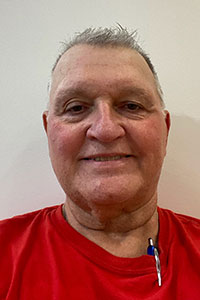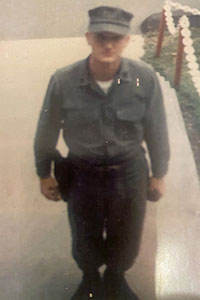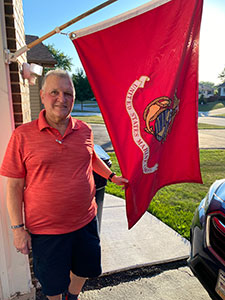Marines Vietnam War Lombard, IL Flight date: 07/20/22
By Mark Splitstone, Honor Flight Chicago Veteran Interview Volunteer
Daniel “Sarge” Devine was born in 1951, the oldest of seven children. He was raised in Lombard, Illinois where his parents and grandparents had lived for decades. He left high school early, worked for a while, and then decided to join the Marine Corps. Since he was only seventeen years old, he had to get his parents’ permission. While his mother wasn’t happy about it, his father approved and signed the permission papers. Sarge left for Boot Camp in September of 1968, near the peak of the Vietnam War.
Boot Camp for Sarge was in San Diego. He says “They didn’t mess around. It was tough and intense, with a brutal schedule of running, marching, drilling, physical training and discipline.” Because he was an active runner and boxer before going to Boot Camp, the physical part of it wasn’t as hard as it was for many of the other men. The drill instructors, though, who were often Vietnam veterans, could get into the recruits’ heads and were allowed to lay hands on them.
After Boot Camp and infantry training, he was assigned to Camp Pendleton in California. His Military Occupation Specialty was artillery, and his specific weapon was the 155 mm self-propelled howitzer. His position was a cannoneer, whose job was to load the shells into the breach. He says it was very hot and loud in the vehicle, and he noticed that many of the old-timers in his unit were hard of hearing. He was assigned to the 5th Marine Expeditionary Brigade, which included a mixture of Vietnam veterans and new Marines. This mixture led to some interesting interactions, and he recalls a time when there was a “Junk on the Bunk” inspection where everyone had to lay all their gear on their bunks. Sarge noticed that one veteran didn’t take his gear out and instead just put his Medal of Honor on his bunk. The inspectors just saluted the medal and moved on.
By the time he got to Pendleton in 1969, many Marine units were beginning to withdraw from Vietnam, and it didn’t appear that he’d remained assigned there. After a year at Pendleton, he recalls that a sergeant major told his unit that they were looking for volunteers to go to the Philippines to guard the Subic Bay Naval Base. He decided that he didn’t want to spend his entire time in the Marines stateside, so he talked a friend into volunteering with him to go to the Philippines.
Although not widely reported by the U.S. government or media, the communist New People’s Army (NPA) had been established in the Philippines in 1969 and was conducting an insurgency against the Filipino government and U.S. forces. They’d often attempt to breach the perimeters of bases to kidnap or kill Americans or to steal munitions. The mission of Sarge and the other Marines was to prevent these breaches. Sarge recalls that when they arrived in the Philippines, one of the first things they were told was that they shouldn’t leave the base because they’d be in danger. The guerillas had many of the same advantages as they did in Vietnam since the climate and terrain of the Philippines are very similar. In fact, the Marine Corps Jungle Warfare Training School was located there at the time, and many Marines trained there before being sent to Vietnam.
The Marines took rotating shifts at guard duty, and whenever there was a breach, a reaction force would be activated and everyone asleep in the barracks would get up and grab their rifles. They’d also make periodic patrols into the jungle to search for guerillas, and Sarge estimates that he made over 100 of these patrols. The Marines would load up in a truck and venture out into the jungle, looking for the guerillas who were usually in groups of two or three, often armed with AK47s. Sarge was usually the leader of these missions because he was a sergeant by this time. He had been promoted to corporal before he left for the Philippines and after only sixteen weeks as a corporal, he was promoted to sergeant. At age eighteen, he was one of the youngest sergeants in the Marines. Most of the men in his unit were older than him, and he says he had to work to convince them that he deserved their respect.



Sarge recalls capturing a guerilla who, after being caught trying to steal munitions from a pier, jumped into the ocean. As he held on to a pillar, Sarge pinned him down with his gun until a PT boat arrived to pick him up. They turned him over to local authorities and Sarge heard that within days the man had been tried and executed. The duty was a constant strain and nearly every day a reaction force was activated or they’d have to do a jungle patrol or both. Stress and sleep deprivation became the norm.
After fourteen months in the Philippines, Sarge had fulfilled his initial three-year commitment but decided to re-enlist for an additional four years. The initial plan was for him to go to Vietnam, but there were no billets there by 1971. Instead, he was assigned to Naval Station Great Lakes, where he became the correctional supervisor at the brig. Many of the men in the brig were Navy recruits who were there for disobeying orders, such as refusing to jump into a pool for drown-proofing. Others were men who had gone AWOL. One of Sarge’s duties was to periodically take a bus around a thirteen-state area to pick up AWOL men who had ended up in local jails. They’d handcuff the men to each other and load them on the bus and take them back to Great Lakes. From there, they’d be sent back to their command.
In 1975, the Marines encouraged him to re-enlist again. Even though he enjoyed his time in the service, he decided that seven years was enough. Upon leaving the military, Sarge worked in various law enforcement roles, including at the Sheriff’s Department Jail in Wheaton. He says this was similar to supervising the brig, but there were obviously some differences. He had earned his GED while still in the military and decided to go to college. He earned his associate’s and bachelor’s degrees in criminal justice and also earned his license as a private detective. Throughout his career, he held a variety of security-related jobs, including being a director of security for corporations, doing consulting work with police departments, and functioning as private security.
Sarge met and married a Filipino woman while stationed there, and she came back to the U.S. with him. They had three daughters together but then divorced after five years. Sarge married his current wife, Diane, in 1976 and they’ve been married for nearly 46 years and have one son together. All told, Sarge has nine grandchildren and very shortly will have nine great-grandchildren as well. Many of them live in the area so he’s able to see them regularly.
Since his retirement, Sarge’s passion has been helping fellow veterans. He is both the Commander and the Service Officer of the Cantigny Post of the American Legion, is on the board of advisors for the Midwest Homeless Shelter for Veterans, and has also earned the Certificate of Veterans Counseling. After years of therapy, he was diagnosed with severe PTSD seven years ago. His symptoms are controlled with medication and psychological counseling through the VA. He navigated the maze of VA regulations and processes and eventually received 100% disability since his health issues were caused by his experiences in the Philippines. He currently works with veterans to guide them through the disability claims process and says that the hardest part is often convincing the men that they deserve it. He says there’s no better feeling than getting a phone call from a veteran that he had helped to let him know that his claim was approved. If any veterans reading this feel that they might be entitled to a disability claim, Sarge says he’d be happy to talk to them. They can reach him at dandev68@comcast.net.
Sarge and Diane attended an Honor Flight reception for a friend of theirs a few years ago and were “blown away” by it. He’s very excited about this opportunity for his own Honor Flight.
Sarge, you are a credit to the U.S. Marines. Your service over many years in precarious assignments was honorable and courageous. Thank you for your invaluable service to our country. Enjoy your well-deserved day of honor!


